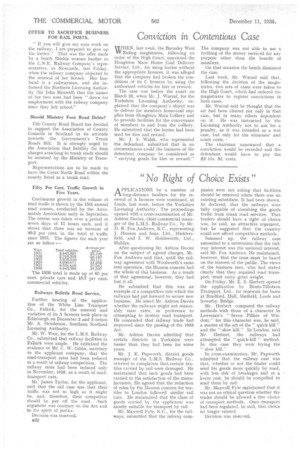"No Right of Choice Exists"
Page 40

If you've noticed an error in this article please click here to report it so we can fix it.
APPLICATIONS by a number of long-distance hauliers for the renewal of A licences were continued, at Leeds, last week, before the Yorkshire Licensing Authority. The proceedings opened with a cross-examination of Mr. Ashton Davies, chief commercial manager of the L.M.S. Railway Co., by Mr. 1). H. Fox Andrews, K.C., representing J. Hanson and Sons, Ltd., Huddersfield, and I. W. Holdsworth, Ltd., Halifax.
After questioning Mr. Ashton Davies on the subject of agreed charges, Mr. Fox Andrews said ,that, until the railway agreement with Woolworth's came into operation, the Hanson concern had the whole of this business. As a result of that agreement, however, they had lost it all.
He submitted that this was an example of a competitive rate which the railways had put forward to secure new business. He asked Mr. Ashton Davies whether the railways might not reasonably raise rates, in preference to attempting to destroy road transport. He contended that railway trade had improved since the passing of the 1933 Act.
Mr. Ashton Davies admitted that certain districts in Yorkshire were busier than they had been for some years.
Mr. J. E. Papworth, district goods manager of the L.M.S. Railway Co., referred to complaints that. certain textiles carried by rail were damaged. He maintained that such goods had been carried to the satisfaction of the manufacturers. He agreed that the reduction of rates by the Hanson concern for textiles to London followed similar rail cuts. He maintained that the class of goods carried by the applicants was mostly suitable for transport by rail.
Mr. Maxwell Fyfe, K.C., for the railways, submitted that the railway corn panies were not asking that facilities should be removed where there was no existing substitute. It had been shown, he declared, that the railways were fully capable of absorbing the goods traffic from trunk road services. That traders should have a right of choice was, he said, an attractive argument, but he suggested that the country could not afford competitive methods.
Summed up, the railway case amounted to a submission that the railway interest was the national interest, said Mr. Fox Andrews. He maintained, however, that the issue must be based on the interest of the public. The views of the business men, who had stated clearly that they required road transport, must carry great weight.
On Friday, Mr. E. S. Herbert opened the application by Bouts-Tillotson Transport, Ltd., for renewals for bases at Bradford, Hull, Sheffield, Leeds and Sowerby Bridge.
Mr. Herbert compared the railway methods with those of a character in Lawrence's "Seven Pillars of Wisdom," for this character was, he said, a master of the art of the " quick kill" and the " slow kill." In London, said Mr. Herbert, the railways had attempted the " quick-kill " method. In this case they were trying the " slow kill,"
In cross-examination, Mr. Papworth admitted that the railway case was that, whether or not the trader could send his goods more quickly by road, with less risk of breakages and at a lower cost, he should be compelled to send them by rail.
Mr. Maxwell Fyfe maintained that it was not an ethical question whether the trader should be allowed a free choice of transport methods. Once transport had been regulated, he said, that choice no longer existed.
Decision was reserved.




































































































